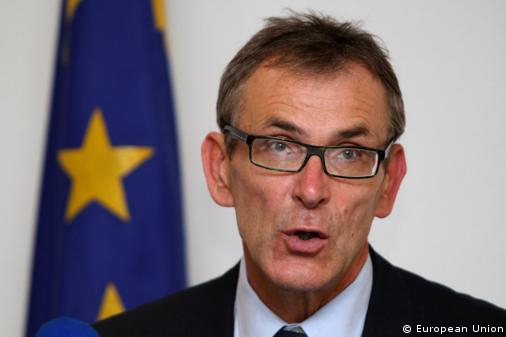NEWS: EU development aid drops with austerity
 Brussels,8 April 2012/ EuroActiv.com/ ACP: European countries reduced their overall development aid budgets in 2011, with some such as Greece and Spain implementing massive cuts in the wake of economic difficulties, according to OECD figures published last Wednesday 4 April.
Brussels,8 April 2012/ EuroActiv.com/ ACP: European countries reduced their overall development aid budgets in 2011, with some such as Greece and Spain implementing massive cuts in the wake of economic difficulties, according to OECD figures published last Wednesday 4 April.
EU aid to developing countries dropped by about €500 million last year, representing only 0.42% of Gross National Income compared with 0.44% in 2010.
EU Commissioner for Development Cooperation Adris Piebalgs (pictured)was quick to point out that despite this, the EU remained the world's biggest donor.
"Despite the crisis, Europe reaffirms its solidarity with the poorest across the world… Development aid is both solidarity and an investment to make the world safer and more prosperous. I therefore call on Member States to reaffirm their commitment to achieving the goal of increasing ODA to 0.7% of GNI by 2015", he said in a statement.
Overall, EU member states’ development aid reached €53 billion in 2011, according to the Organisation for Economic Cooperation and Development (OECD), an international organisation covering most of the world’s developed countries.
There were massive declines in aid in crisis-wracked Spain (-32.7%) and Greece (-39.3%). There were also significant drops in Austria (-14.3%) and Belgium (-13.3%).
In contrast, global development aid budgets had risen continuously in previous years, increasing by 63% between 2000 and 2010.
Official development assistance (ODA) is typically made up of bilateral development projects, humanitarian aid, and debt relief.
Angel Gurría, the OECD’s secretary-general, said: “The fall of ODA is a source of great concern, coming at a time when developing countries have been hit by the knock-on effect of the crisis and need it most.”
“I commend the countries that are keeping their commitments in spite of tough fiscal consolidation plans. They show that the crisis should not be used as an excuse to reduce development cooperation contributions,” he added.
Europe still the biggest donor
The countries that increased their aid budgets include Germany (+5.9%), Sweden (+10.5%) and Italy (+33%). The OECD says the massive Italian increase was due to debt forgiveness grants and an increase in refugees arriving from North Africa.
With €53 billion in 2011, the EU and its member states still constituted by far the biggest development aid donor, giving over twice as much as the United States of America, the next-biggest.
This point was highlighted by the European Commissioner in charge of development aid, Andris Piebalgs: "Despite the crisis, Europe reaffirms its solidarity with the poorest across the world," he said on Wednesday.
Four EU Member States (Sweden, Denmark, the Netherlands and Luxembourg) continue to exceed the 0.7% target, with Denmark, Luxembourg and Sweden aiming to reach 1% of GNI.
Nonetheless, International aid organisations have been quick to criticisethe overall decrease in European aid, arguing that any cuts in these relatively small parts of national and EU budgets will yield only minor savings.
Catherine Olier, Oxfam’s EU development expert, said: “Cutting aid is no way to balance the books. Even small cuts in aid cost lives as people are denied life-saving medicines and clean water. Aid is such a tiny part of European budgets that cutting it has no discernible impact on deficits – it is like cutting your hair to lose weight.”
There were also significant declines in aid budgets outside the EU, with global development aid dropping by 3% in 2011. The United States’ aid declined by 0.9% in real terms between 2010 and 2011, while that of Japan fell by 10.7%.
European Commissioner for Development Andris Piebalgs said in a statement that the EU and its member states remain the world’s largest aid donor but that they are also far short of their official objective to have aid budgets reach 0.7% of gross national income by 2015.
“Despite the crisis, Europe reaffirms its solidarity with the poorest across the world. … Development aid is both solidarity and an investment to make the world safer and more prosperous,” he said.
Olivier Consolo, director of Concord, the European Confederation of Relief and Development NGOs, said “European countries are cutting aid faster than their economies are shrinking.”
“European countries should not turn their backs to the over 3 billion people living on less than $2.50 a day,” he added.
Lars Thunell, CEO of the International Finance Corporation (IFC), the private sector arm of the World Bank Group, argued that international development banks could partially fill the gap left by government aid.
“It may come as news to some, but multilateral and bilateral development banks have increased their financing of the private sector fourfold over the last decade, boosting their annual combined investment from US$10 billion to over $40 billion,” he said.
